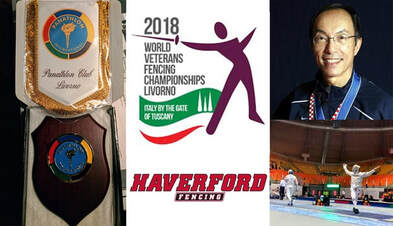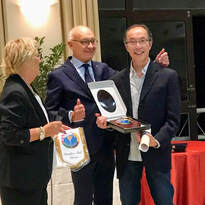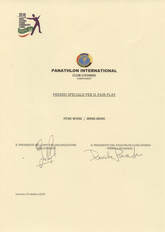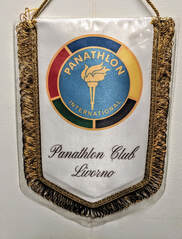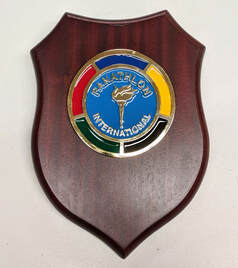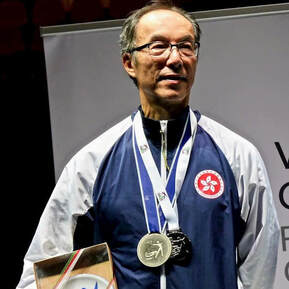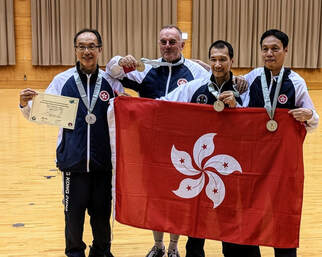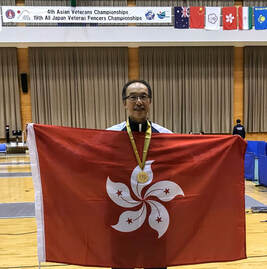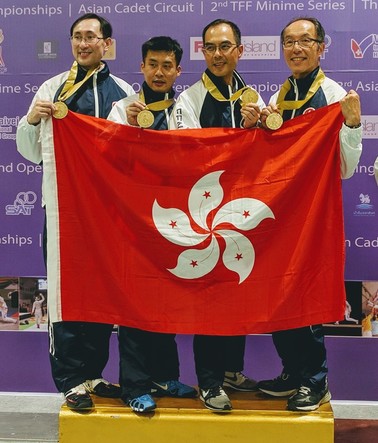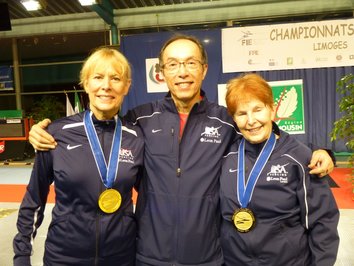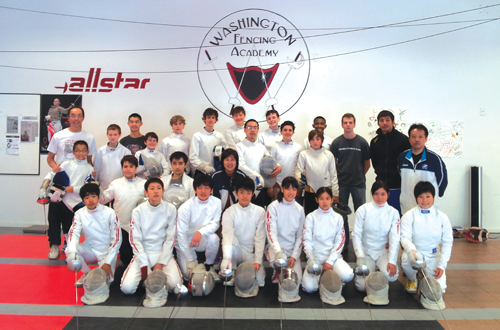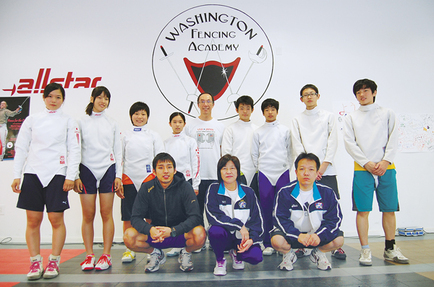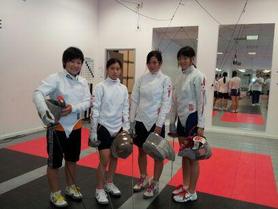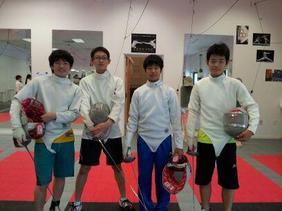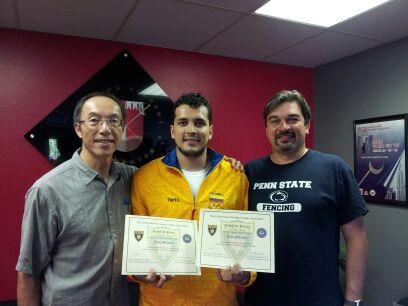Oct 26, 2018
HAVERFORD, Pa. – Haverford College fencing assistant coach Wang Yung recently captured a silver medal at the world championships in the 60 and over age classification. Yung won his medal representing Hong Kong in sabre, the squad he also helps for both the men's and women's teams at Haverford.
However, his success was far from limited to an individual perspective. At the conclusion of the World Championships, Yung coached the women's 60 and over team to a gold medal at the World Championships and was also awarded the Sportsmanship Award from the Livorno Club of Panathlon International.
"Panathlon International is an international movement for the promotion and dissemination of culture and sports ethics," said Yung. "It is recognized by the International Olympic Committee with the aim to deepen, disseminate, and defend the values of sports as a tool for training and enhancement of person and as a vehicle of solidarity between men and peoples."
He continued by adding that, "Livorno has a population of about 160,000 but it is the home of two fencing clubs. One club, Fides Livorno was founded in 1892 as has produced some of the greatest fencers who have become legends in the history of fencing. The fencers in Livorno have World and Olympic Champions in multiple weapons. Livorno is important to fencing and fencing is important to Livorno. In that rich historical context, being recognized by the Livorno Club of Panathlon International is an amazing honor. As a fencer, I rank this award higher than winning the silver medal because this is not something I could have trained for or defeat someone to win."
From a competition perspective, his individual silver medal was validation for all of the hard work he continues to put into the sport. "It means that the methodology I used and teach works. On the level relating to switching country affiliation, my silver medal was the highest finish of any US male sabre fencer at the World Championships. I hope this is a reply to the assumption that I switched affiliation because I am not good enough to compete for the US team."
Competing on the largest stage, his competition was never short on drama. "Each bout is a battle in itself and unlike others of the day. The bouts against last year's world champion were tactically complicated. The ones against the German and the French were tests of willpower and overcoming fear. I won each bout by one touch. Each of those bouts challenged me in different ways and gave me opportunities to challenge myself."
The World Championships were also special for another reason. As alluded to earlier, Yung had the chance to represent Hong Kong on the international stage. "My family immigrated to the US when I was six years old so the majority of my life experience is being American. I loved watching sports and have been a fan of the Olympic Games. I wanted to earn the right to wear "USA" on my uniform since I was young."
"I grew up in the lower East Side of New York City. Being American meant belonging to a diversity of races and ethnic backgrounds. America gave our families the opportunity to grow and be part of this country. It was the "American Experience". I would spend decades volunteering in my diverse community advocating for civil rights, gender equality, and economic justice. I wanted to help sustain the American dream. My switching country of representation is not a negative statement about America or being American. I have proudly earned the opportunity to represent the USA in 14 World Championships and have won seven world medals including two golds for my country. This year, I switched to represent another country not because I have a big platform. On the contrary, I hope those who know me in fencing will see my action on a more personal level because I hope that to them, I may not be a faceless, nameless "other". Hopefully, when they see the vilification of the "other", it affects someone they know.
Although there was no overlap with his coaching and competition roles, that by no means meant Yung's days were anything but pressure-packed. "My student, Jane Eyre, won her seventh world championships at this Championships and my other student who is three times world champion, came in tenth. Coaching two world level fencers while trying to remain competitive myself is the balance challenge. As any fencing coach will tell you coaching and competing are total opposites. As a coach, you have to let the student hit you and stop you from hitting them. As a competitor, your mindset is to never let it happen. In terms of muscle memory, it is difficult to remain sharp as a competitor if you spend more time coaching and letting yourself get hit then competing and hitting. The challenge to balance the two is throughout the entire year of training and not just at the tournament."
As for the future, Yung hopes to continue to excel on all spectrums of the world fencing stage. "I want to do both for as long as I can. Intellectually, the challenge is to take what I learn as a competitor and translate it into a lesson to keep my student ahead of the crowd. At Haverford, it means bringing world level fencing into the Andy Kates Fencing Salle. We are fortunate to have very bright and dedicated fencers on the Haverford fencing team."
HAVERFORD, Pa. – Haverford College fencing assistant coach Wang Yung recently captured a silver medal at the world championships in the 60 and over age classification. Yung won his medal representing Hong Kong in sabre, the squad he also helps for both the men's and women's teams at Haverford.
However, his success was far from limited to an individual perspective. At the conclusion of the World Championships, Yung coached the women's 60 and over team to a gold medal at the World Championships and was also awarded the Sportsmanship Award from the Livorno Club of Panathlon International.
"Panathlon International is an international movement for the promotion and dissemination of culture and sports ethics," said Yung. "It is recognized by the International Olympic Committee with the aim to deepen, disseminate, and defend the values of sports as a tool for training and enhancement of person and as a vehicle of solidarity between men and peoples."
He continued by adding that, "Livorno has a population of about 160,000 but it is the home of two fencing clubs. One club, Fides Livorno was founded in 1892 as has produced some of the greatest fencers who have become legends in the history of fencing. The fencers in Livorno have World and Olympic Champions in multiple weapons. Livorno is important to fencing and fencing is important to Livorno. In that rich historical context, being recognized by the Livorno Club of Panathlon International is an amazing honor. As a fencer, I rank this award higher than winning the silver medal because this is not something I could have trained for or defeat someone to win."
From a competition perspective, his individual silver medal was validation for all of the hard work he continues to put into the sport. "It means that the methodology I used and teach works. On the level relating to switching country affiliation, my silver medal was the highest finish of any US male sabre fencer at the World Championships. I hope this is a reply to the assumption that I switched affiliation because I am not good enough to compete for the US team."
Competing on the largest stage, his competition was never short on drama. "Each bout is a battle in itself and unlike others of the day. The bouts against last year's world champion were tactically complicated. The ones against the German and the French were tests of willpower and overcoming fear. I won each bout by one touch. Each of those bouts challenged me in different ways and gave me opportunities to challenge myself."
The World Championships were also special for another reason. As alluded to earlier, Yung had the chance to represent Hong Kong on the international stage. "My family immigrated to the US when I was six years old so the majority of my life experience is being American. I loved watching sports and have been a fan of the Olympic Games. I wanted to earn the right to wear "USA" on my uniform since I was young."
"I grew up in the lower East Side of New York City. Being American meant belonging to a diversity of races and ethnic backgrounds. America gave our families the opportunity to grow and be part of this country. It was the "American Experience". I would spend decades volunteering in my diverse community advocating for civil rights, gender equality, and economic justice. I wanted to help sustain the American dream. My switching country of representation is not a negative statement about America or being American. I have proudly earned the opportunity to represent the USA in 14 World Championships and have won seven world medals including two golds for my country. This year, I switched to represent another country not because I have a big platform. On the contrary, I hope those who know me in fencing will see my action on a more personal level because I hope that to them, I may not be a faceless, nameless "other". Hopefully, when they see the vilification of the "other", it affects someone they know.
Although there was no overlap with his coaching and competition roles, that by no means meant Yung's days were anything but pressure-packed. "My student, Jane Eyre, won her seventh world championships at this Championships and my other student who is three times world champion, came in tenth. Coaching two world level fencers while trying to remain competitive myself is the balance challenge. As any fencing coach will tell you coaching and competing are total opposites. As a coach, you have to let the student hit you and stop you from hitting them. As a competitor, your mindset is to never let it happen. In terms of muscle memory, it is difficult to remain sharp as a competitor if you spend more time coaching and letting yourself get hit then competing and hitting. The challenge to balance the two is throughout the entire year of training and not just at the tournament."
As for the future, Yung hopes to continue to excel on all spectrums of the world fencing stage. "I want to do both for as long as I can. Intellectually, the challenge is to take what I learn as a competitor and translate it into a lesson to keep my student ahead of the crowd. At Haverford, it means bringing world level fencing into the Andy Kates Fencing Salle. We are fortunate to have very bright and dedicated fencers on the Haverford fencing team."
Organizers of 2018 World Veteran Fencing Championships
honored Wang Yung with the
Panathlon International Club Livorno Award for Fair Play
Panathlon International is recognized by the International Olympic Committee and is a member of the SportAccord and the International Fair Play Committee.
Livorno is steeped in fencing history and is home of some of the most famous fencers in history.
Presenting the award is Gulio Paroli, World Champion in Foil and Sabre.
Livorno is steeped in fencing history and is home of some of the most famous fencers in history.
Presenting the award is Gulio Paroli, World Champion in Foil and Sabre.
Wang Yung wins
Individual Silver Category B
2018 World Veteran Fencing Championships
Livorno, Italy
Wang Yung wins Individual Gold and Team Silver
2018 Asian Veteran Fencing Championships
Wakayama, Japan
September 2017
Maitre Yung Wins Two Gold in Bangkok
Representing Hong Kong at the 2017 Asian / Oceana Veteran Championships,
Maitre Wang Yung won Gold in his Individual Age event and the Veteran Men's Sabre Team event
Maitre Wang Yung won Gold in his Individual Age event and the Veteran Men's Sabre Team event
Maitre Yung in the NEWS Haverford men won the 2017 MACFA Sabre Squad Championships
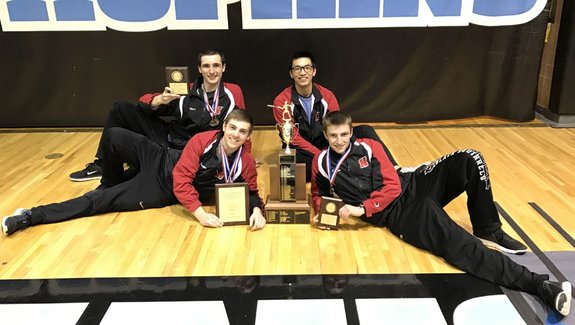 Hare, Li, Parker and Braun with MACFA Sabre Squad Champion trophy and individual plaques and medals.
Hare, Li, Parker and Braun with MACFA Sabre Squad Champion trophy and individual plaques and medals.
At the 2017 Mid-Atlantic Collegiate Fencing Association Championships, the Haverford men saberist won the MACFA Sabre Squad Championship. The last time Haverford won the Sabre Squad Championship was in 2005. The Fencers on the Team were John Hare, Gabe Braun, Dave Parker and alternate Henry Li. All three starters qualified for the top 16 individual places with Hare winning the silver medal and Braun placing 6th.
At the 2017 National Intercollegiate Women's Fencing Association (NIWFA) Championships saberist Anna Neuheardt place 6th to win All-NIFWA honors. Saberist Emily Brown also advanced to the individual round giving Haverford College two Saberist in the top 16 for the first time since the 2013 season.
At the 2017 National Intercollegiate Women's Fencing Association (NIWFA) Championships saberist Anna Neuheardt place 6th to win All-NIFWA honors. Saberist Emily Brown also advanced to the individual round giving Haverford College two Saberist in the top 16 for the first time since the 2013 season.
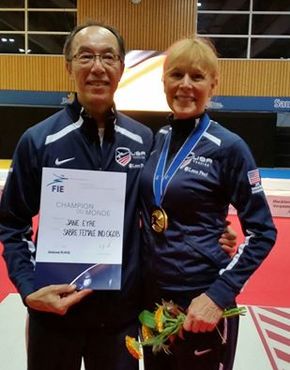
USA Fencing’s Top Moments of 2016
By Kristen Henneman
Jane Eyre Brings Home Fourth Straight Gold at Veteran World Championships
USA Fencing’s most decorated veteran fencer, Jane Eyre (Woolwich Township, N.J.),
cruised to her fourth consecutive women’s 60-69 saber title at the Veteran World Championships,
giving her six individual golds and 12 total World Championship medals in her career.
The No. 1 seed entering the tournament, Eyre earned a bye into the table of 16.
She won her first two direct elimination bouts 10-2 and 10-4 before easily moving
into the semi-final with a 10-1 victory and then a 10-7 victory in the gold medal bout
against a former world champion
By Kristen Henneman
Jane Eyre Brings Home Fourth Straight Gold at Veteran World Championships
USA Fencing’s most decorated veteran fencer, Jane Eyre (Woolwich Township, N.J.),
cruised to her fourth consecutive women’s 60-69 saber title at the Veteran World Championships,
giving her six individual golds and 12 total World Championship medals in her career.
The No. 1 seed entering the tournament, Eyre earned a bye into the table of 16.
She won her first two direct elimination bouts 10-2 and 10-4 before easily moving
into the semi-final with a 10-1 victory and then a 10-7 victory in the gold medal bout
against a former world champion
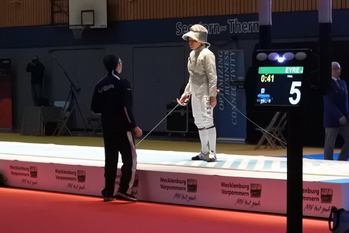
2016 Veteran World Championships
Stralsund, Germany
Yung coaching Jane Eyre to her 4th consecutive Gold in Vet 60+ Sabre
He also coached the Women's Sabre team to Silver against Germany
Stralsund, Germany
Yung coaching Jane Eyre to her 4th consecutive Gold in Vet 60+ Sabre
He also coached the Women's Sabre team to Silver against Germany
|
|
|
|
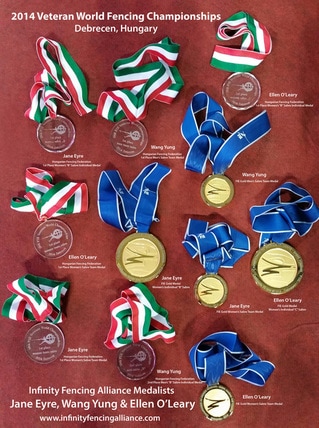
2014 Veteran World Championships
Debrecen, Hungary
Wang Yung and his Two Fencers Win 5 Gold & 1 Silver Medals
Maitre de Sabre Wang Yung won Silver in "B" category individual sabre event and Gold in the Men's Sabre Team event.
(Click here for more details)
Jane Eyre became the most decorated veteran fencer in Team USA’s history when she claimed her fourth individual title and led the Americans to a 1-2-3 in the "B" category Saber. Eyre also won Gold in the Women's Sabre Team. (Click here for more details)
Ellen O'Leary took her second Individual World Title category "C" Sabre and Gold in the Women's Sabre Team
(Click here for more details)
The 5 Medals won by the three fencers was 1/3 of the entire US Team medal count.
Debrecen, Hungary
Wang Yung and his Two Fencers Win 5 Gold & 1 Silver Medals
Maitre de Sabre Wang Yung won Silver in "B" category individual sabre event and Gold in the Men's Sabre Team event.
(Click here for more details)
Jane Eyre became the most decorated veteran fencer in Team USA’s history when she claimed her fourth individual title and led the Americans to a 1-2-3 in the "B" category Saber. Eyre also won Gold in the Women's Sabre Team. (Click here for more details)
Ellen O'Leary took her second Individual World Title category "C" Sabre and Gold in the Women's Sabre Team
(Click here for more details)
The 5 Medals won by the three fencers was 1/3 of the entire US Team medal count.
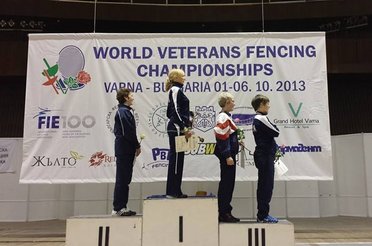
2013 Veteran World Championships
Varna, Bulgaria
Jane Eyre, Gold Veteran 60+ Sabre & Gold Women's Sabre Team
Varna, Bulgaria
Jane Eyre, Gold Veteran 60+ Sabre & Gold Women's Sabre Team
Egyptian Olympian trains with Maitre Wang Yung to prepare for
London Olympic Games 2012
Link to NBC NEWS:
http://www.king5.com/sports/olympics/2012/video/Egyptian-Olympic-fencer-training-in-Issaquah-162718286.html
London Olympic Games 2012
Link to NBC NEWS:
http://www.king5.com/sports/olympics/2012/video/Egyptian-Olympic-fencer-training-in-Issaquah-162718286.html
|
Japan Fencing Federation Scopes out qualifying Olympic fencers at Washington Fencing Academy
Posted on 10 September 2012. Tags: 2012, Vol 31 No 37 | September 8 - September 14 A group of eight junior elite sabre fencers and three coaches from Japan, sent by the Japan Fencing Federation, visited the Washington Fencing Academy. There, they evaluated qualifying fencers for the 2020 Olympic Games in Tokyo. Local students of the Washington Fencing Academy, along with the Sabre Fencing Master Wang Yung, and assistant coaches Allen Wang and Jeff Larsen of Portland, were able to spend time with the elite team during their visit from August 27 to September 1. (end) |
Japanese fencers join international trend to train in Issaquah
September 4, 2012
By Christina Corrales-Toy
A delegation of young fencers and their three coaches came from Japan to Issaquah to train with saber coach Wang Yung (center, standing) at the Washington Fencing Academy the week of Aug. 27. By Christina Corrales-Toy
Issaquah has become quite the destination for elite fencers looking to improve their game. Fencers from all over the world travel to the Washington Fencing Academy, just to train with saber coach Wang Yung. Yung has coached national and world champions. In July, the coach hosted Mannad Zeid, an Egyptian fencer who spent time training at the Washington Fencing Academy before he traveled to London for the 2012 Olympic Games.
The parade of international competitors hoping to learn from Yung continued the week of Aug. 27, as eight junior fencers from Japan traveled to Issaquah to train with the coach for a week.
“I’m flattered,” Yung said. “I don’t know quite why they chose me but there are a lot of places where there are good coaches, so I’m just flattered that they’ve chosen to come here.”
The fencers, four boys and four girls ranging in age from 13 to 15, came to work with Yung as part of a developmental program to improve their skills. The three coaches who accompanied the fencers from Japan said through interpreter Kayoko Hunter that they hoped the students would learn more about the American style of saber fencing in their week with Yung.
“For the sport of saber, the Americans are more advanced than Japan,” said Satoshi Ogawa, one of the coaches. “So the main reason we are here is to be exposed to different styles.”
A saber is one of three weapons commonly used in fencing. Saber fencing is unique in that points can be scored by hitting the opponent with the side of the blade, as well as the point of the blade. Fencing with a saber requires great body control and quick movements.
During their stay Yung focused on the fundamentals of the sport. “I’ve been working on improving their basic technique,” he said. “One of the most important things about fencing is to know what your mistakes are because saber is so fast, if you make a mistake, you are just going to lose. So I focus a lot on basics but I also throw in some pretty advanced footwork and bladework.”
Yung said the Japanese fencers’ technique was not as advanced as the American fencers he coaches, but their discipline and focus was much better. “I think the Japanese fencers are overall much more focused,” he said. “They are very coachable. The degree of focus is very different. Japanese fencers really try to learn things well. Their attention span is better.”
The Japanese coaches would not directly say it, but Yung believed the fencers were sent here by the Japanese Fencing Federation to prepare for the 2020 Olympic Games. “Most Asian countries are very subtle about how they express things but I don’t think they would spend the kind of money that they spent to come over here unless there is a master plan,” he said.
Tokyo is one of three cities in the running to host the 2020 Olympic Games. The winner will not be announced until 2013, but Yung said this was probably the motivation for the country’s early preparation. “I think they’re preparing for 2020, but that’s what a country should be doing if they’re potentially hosting the Olympics,” he said.
Mieko Saito, one of the coaches, said that while some of the students may have Olympic aspirations, the goal of the trip was mainly to expose the group to saber fencing and improve their technique. “It’s a direction towards developing the students to an elite level,” she said. “It’s not specifically targeted toward the Olympics, but more encouraging our students to develop their skills.”
The students spent the week training with practice sessions twice a day. Still, they had the opportunity to experience some of Issaquah when they visited Triple XXX Rootbeer Drive-in and Lake Sammamish.
Saito said the students enjoyed their time in Issaquah and appreciated the support from the local fencing community. “We just love it here,” she said. “The experience as a whole, seeing the American fencers and everything, has been great.”
Other Stories of Interest: Lake Sammamish, Triple XXX Rootbeer Drive-in
Written by Christina Corrales-Toy · Filed Under Local News, Sports, Sports News
Copyright © 2012 by Issaquah Press Inc. All rights reserved. This material may not be published, rewritten or redistributed without permission. Email editor@isspress.com.
September 4, 2012
By Christina Corrales-Toy
A delegation of young fencers and their three coaches came from Japan to Issaquah to train with saber coach Wang Yung (center, standing) at the Washington Fencing Academy the week of Aug. 27. By Christina Corrales-Toy
Issaquah has become quite the destination for elite fencers looking to improve their game. Fencers from all over the world travel to the Washington Fencing Academy, just to train with saber coach Wang Yung. Yung has coached national and world champions. In July, the coach hosted Mannad Zeid, an Egyptian fencer who spent time training at the Washington Fencing Academy before he traveled to London for the 2012 Olympic Games.
The parade of international competitors hoping to learn from Yung continued the week of Aug. 27, as eight junior fencers from Japan traveled to Issaquah to train with the coach for a week.
“I’m flattered,” Yung said. “I don’t know quite why they chose me but there are a lot of places where there are good coaches, so I’m just flattered that they’ve chosen to come here.”
The fencers, four boys and four girls ranging in age from 13 to 15, came to work with Yung as part of a developmental program to improve their skills. The three coaches who accompanied the fencers from Japan said through interpreter Kayoko Hunter that they hoped the students would learn more about the American style of saber fencing in their week with Yung.
“For the sport of saber, the Americans are more advanced than Japan,” said Satoshi Ogawa, one of the coaches. “So the main reason we are here is to be exposed to different styles.”
A saber is one of three weapons commonly used in fencing. Saber fencing is unique in that points can be scored by hitting the opponent with the side of the blade, as well as the point of the blade. Fencing with a saber requires great body control and quick movements.
During their stay Yung focused on the fundamentals of the sport. “I’ve been working on improving their basic technique,” he said. “One of the most important things about fencing is to know what your mistakes are because saber is so fast, if you make a mistake, you are just going to lose. So I focus a lot on basics but I also throw in some pretty advanced footwork and bladework.”
Yung said the Japanese fencers’ technique was not as advanced as the American fencers he coaches, but their discipline and focus was much better. “I think the Japanese fencers are overall much more focused,” he said. “They are very coachable. The degree of focus is very different. Japanese fencers really try to learn things well. Their attention span is better.”
The Japanese coaches would not directly say it, but Yung believed the fencers were sent here by the Japanese Fencing Federation to prepare for the 2020 Olympic Games. “Most Asian countries are very subtle about how they express things but I don’t think they would spend the kind of money that they spent to come over here unless there is a master plan,” he said.
Tokyo is one of three cities in the running to host the 2020 Olympic Games. The winner will not be announced until 2013, but Yung said this was probably the motivation for the country’s early preparation. “I think they’re preparing for 2020, but that’s what a country should be doing if they’re potentially hosting the Olympics,” he said.
Mieko Saito, one of the coaches, said that while some of the students may have Olympic aspirations, the goal of the trip was mainly to expose the group to saber fencing and improve their technique. “It’s a direction towards developing the students to an elite level,” she said. “It’s not specifically targeted toward the Olympics, but more encouraging our students to develop their skills.”
The students spent the week training with practice sessions twice a day. Still, they had the opportunity to experience some of Issaquah when they visited Triple XXX Rootbeer Drive-in and Lake Sammamish.
Saito said the students enjoyed their time in Issaquah and appreciated the support from the local fencing community. “We just love it here,” she said. “The experience as a whole, seeing the American fencers and everything, has been great.”
Other Stories of Interest: Lake Sammamish, Triple XXX Rootbeer Drive-in
Written by Christina Corrales-Toy · Filed Under Local News, Sports, Sports News
Copyright © 2012 by Issaquah Press Inc. All rights reserved. This material may not be published, rewritten or redistributed without permission. Email editor@isspress.com.
|
Maitre de Sabre Wang Yung hosts a USA JAPAN Elite Sabre Camp in Issaquah, Washington August 30, 2012 Eight nationally ranked cadet sabre fencers from Japan are participating with a group of US fencers in an elite sabre camp this week at the Washington Fencing Academy in Issaquah, WA. The camp will prepare the fencers for competition in the upcoming 2012- 2013 international fencing season. It is coached by Wang Yung who is a Maitre de Sabre which is the highest ranking for a sabre coach. Yung is also the 2011 Veteran Sabre World Champion. |
US Fencing Coaches Association 3 Weapon Clinic at Fencing Academy of Denver
|
August 26, 2012
Maitre Wang Yung was an instructor in coaching sabre at the USFCA 3 Weapon Clinic at Fencing Academy of Denver, founded and owned by Tom Strzalkowski who is a former Olympian. A Columbian national team sabre fencer, Julio Montoya, received his USFCA Prevot certification during the event. Prevot is the 3rd in the 4 levels of certification that can be earned by a fencing coach. Maitre being the top level. This 3 Weapon Clinic is one of many clinics offered across the United States by the USFCA for training and certifying fencing coaches for fencing clubs, schools, and universities. The United States Fencing Coaches Association is dedicated to developing and maintaining the quality of fencing instruction, and to serve the many needs of fencing coaches in the United States. A USFCA member shares a commitment with hundreds of others who are devoted to the improvement of US fencing though the associations' activities. www.usfca.org |
Olympics-bound Egyptian fencer trains in Issaquah
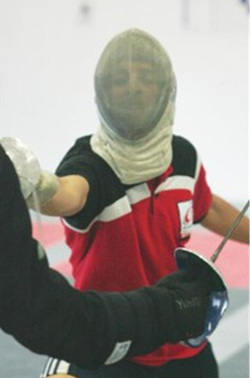
July 24, 2012
By Christina Corrales-Toy
Mannad Zeid, Egyptian Olympic fencer ranked 39th worldwide in the saber, lunges at Washington Fencing Academy expert saber coach Wang Yung July 18 in Issaquah to improve his technique with a few adjustments prior to the XXX Olympiad in London. By Greg Farrar
At just 22 years old, Egyptian fencer Mannad Zeid is just days away from competing on a stage reserved for only the world’s elite athletes.
On July 29, Zeid will grab his saber, put on his mask and prepare for one of the most intense moments of his fencing career when he participates in the men’s individual saber competition at the 2012 London Olympics.
Zeid is from Alexandria, Egypt, and has been fencing nearly all of his life. The road to London took a stop in Issaquah last week when he came to train with Wang Yung, an expert saber coach at the Washington Fencing Academy.
“I came here to train with him for a week because he has a lot of experience,” Zeid said. “He has already improved me within three days.”
Yung is one of the best saber coaches in the country. He’s trained national and world champions and still competes in the sport himself.
The goal of the week was not to completely change Zeid’s fencing style ahead of the games, but to apply subtle changes to his technique. This is the first time that Zeid and Yung have worked together, but Yung was impressed with how quickly the young fencer made adjustments.
“I’ve been coaching for many years and you don’t often see an athlete like this who can actually make some, what would be subtle, but very rapid changes,” Yung said.
Yung added that opponents can expect to see a different fighter in Zeid after their week together.
“I added to his repertoire of attacks, and a few more things,” Yung said. “So for those that have fenced Mannad before, in London they are going to see a little bit of a different version, which is a good thing.”
Zeid, who recently graduated from medical school, did not have the luxury to train 24/7 for the upcoming games, unlike some of his international counterparts. But he did his best to manage a training schedule, while studying to be a pharmacist.
“I trained three days per week, and studied for about two hours per day,” he said. “Nothing is in my mind except for training and my studies, and my family helped me with that. They always encouraged me, they helped me during study, and anything I needed, they gave to me.”
The Olympian added that the Egyptian revolution had an effect on his training as the team lost funding to attend camps and training sessions. The athletes themselves had to foot much of the costs of training.
“Balancing the revolution has been a big problem for us for training,” he said. “We stopped training for several months and now there’s no money for us, for making camps, for training, for traveling abroad, for participating in competition.”
Zeid is among a field of 37 fencers who will compete in the men’s individual saber competition. His main goal for the event is to represent his country well.
“I want to make a good result for my country,” he said. “I know that it’s very difficult, but I hope to win a medal.”
Zeid’s time in Issaquah wasn’t all work and no play. The fencer stayed with the family of Washington Fencing Academy cofounder Serge Timacheff, who made sure Zeid experienced everything that Issaquah had to offer.
From visits to Costco, Las Margaritas and Triple XXX Rootbeer Drive-in, to a meet-and-greet with Mayor Ava Frisinger, Zeid grew quite fond of the Issaquah community.
“I like the city because it is very calm,” Zeid said. “All the Americans here are very friendly to me.”
The Washington Fencing Academy boasts a strong international presence and holds relationships with fencing clubs around the world. The staff and coaches, in particular, have important international fencing connections and experience. Timacheff is the official photographer for the International Fencing Federation and Yung brought home gold at the World Veteran Fencing Championship in 2011.
These connections allow the Issaquah club to bring in world-class athletes. Timacheff said that visits such as these are important to the club and its members, allowing them to meet and learn from elite international athletes.
“While this is a place to come work out and learn a cool sport, it’s much more than that,” Timacheff said. “It’s also a place to learn about the world and to be part of a culture and a community and a worldwide movement of a spirit that speaks to sportsmanship and friendship.”
During his visit, Zeid took the time to fence many of the Washington Fencing Academy members. From young kids to adults, he took the time to meet with everybody, showing he wasn’t above any sort of competition. It’s an experience that Yung hopes will motivate his students at the academy to work that much harder.
“I hope that having Mannad here, people get the sense that we are performing at an elite level,” Yung said, “and I hope that it inspires everybody at the club.”
Christina Corrales-Toy: 392-6434, ext. 241, or isspress@isspress.com. Comment at www.issaquahpress.com.
By Christina Corrales-Toy
Mannad Zeid, Egyptian Olympic fencer ranked 39th worldwide in the saber, lunges at Washington Fencing Academy expert saber coach Wang Yung July 18 in Issaquah to improve his technique with a few adjustments prior to the XXX Olympiad in London. By Greg Farrar
At just 22 years old, Egyptian fencer Mannad Zeid is just days away from competing on a stage reserved for only the world’s elite athletes.
On July 29, Zeid will grab his saber, put on his mask and prepare for one of the most intense moments of his fencing career when he participates in the men’s individual saber competition at the 2012 London Olympics.
Zeid is from Alexandria, Egypt, and has been fencing nearly all of his life. The road to London took a stop in Issaquah last week when he came to train with Wang Yung, an expert saber coach at the Washington Fencing Academy.
“I came here to train with him for a week because he has a lot of experience,” Zeid said. “He has already improved me within three days.”
Yung is one of the best saber coaches in the country. He’s trained national and world champions and still competes in the sport himself.
The goal of the week was not to completely change Zeid’s fencing style ahead of the games, but to apply subtle changes to his technique. This is the first time that Zeid and Yung have worked together, but Yung was impressed with how quickly the young fencer made adjustments.
“I’ve been coaching for many years and you don’t often see an athlete like this who can actually make some, what would be subtle, but very rapid changes,” Yung said.
Yung added that opponents can expect to see a different fighter in Zeid after their week together.
“I added to his repertoire of attacks, and a few more things,” Yung said. “So for those that have fenced Mannad before, in London they are going to see a little bit of a different version, which is a good thing.”
Zeid, who recently graduated from medical school, did not have the luxury to train 24/7 for the upcoming games, unlike some of his international counterparts. But he did his best to manage a training schedule, while studying to be a pharmacist.
“I trained three days per week, and studied for about two hours per day,” he said. “Nothing is in my mind except for training and my studies, and my family helped me with that. They always encouraged me, they helped me during study, and anything I needed, they gave to me.”
The Olympian added that the Egyptian revolution had an effect on his training as the team lost funding to attend camps and training sessions. The athletes themselves had to foot much of the costs of training.
“Balancing the revolution has been a big problem for us for training,” he said. “We stopped training for several months and now there’s no money for us, for making camps, for training, for traveling abroad, for participating in competition.”
Zeid is among a field of 37 fencers who will compete in the men’s individual saber competition. His main goal for the event is to represent his country well.
“I want to make a good result for my country,” he said. “I know that it’s very difficult, but I hope to win a medal.”
Zeid’s time in Issaquah wasn’t all work and no play. The fencer stayed with the family of Washington Fencing Academy cofounder Serge Timacheff, who made sure Zeid experienced everything that Issaquah had to offer.
From visits to Costco, Las Margaritas and Triple XXX Rootbeer Drive-in, to a meet-and-greet with Mayor Ava Frisinger, Zeid grew quite fond of the Issaquah community.
“I like the city because it is very calm,” Zeid said. “All the Americans here are very friendly to me.”
The Washington Fencing Academy boasts a strong international presence and holds relationships with fencing clubs around the world. The staff and coaches, in particular, have important international fencing connections and experience. Timacheff is the official photographer for the International Fencing Federation and Yung brought home gold at the World Veteran Fencing Championship in 2011.
These connections allow the Issaquah club to bring in world-class athletes. Timacheff said that visits such as these are important to the club and its members, allowing them to meet and learn from elite international athletes.
“While this is a place to come work out and learn a cool sport, it’s much more than that,” Timacheff said. “It’s also a place to learn about the world and to be part of a culture and a community and a worldwide movement of a spirit that speaks to sportsmanship and friendship.”
During his visit, Zeid took the time to fence many of the Washington Fencing Academy members. From young kids to adults, he took the time to meet with everybody, showing he wasn’t above any sort of competition. It’s an experience that Yung hopes will motivate his students at the academy to work that much harder.
“I hope that having Mannad here, people get the sense that we are performing at an elite level,” Yung said, “and I hope that it inspires everybody at the club.”
Christina Corrales-Toy: 392-6434, ext. 241, or isspress@isspress.com. Comment at www.issaquahpress.com.
Contact: 425-761-1673 mailto:wyung888@gmail.com
